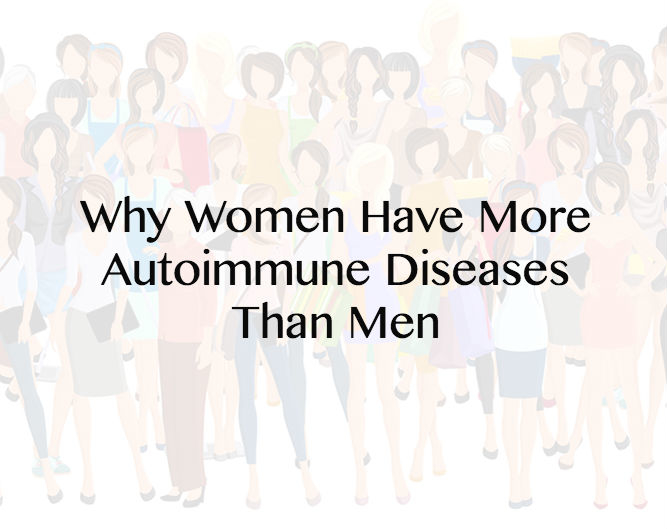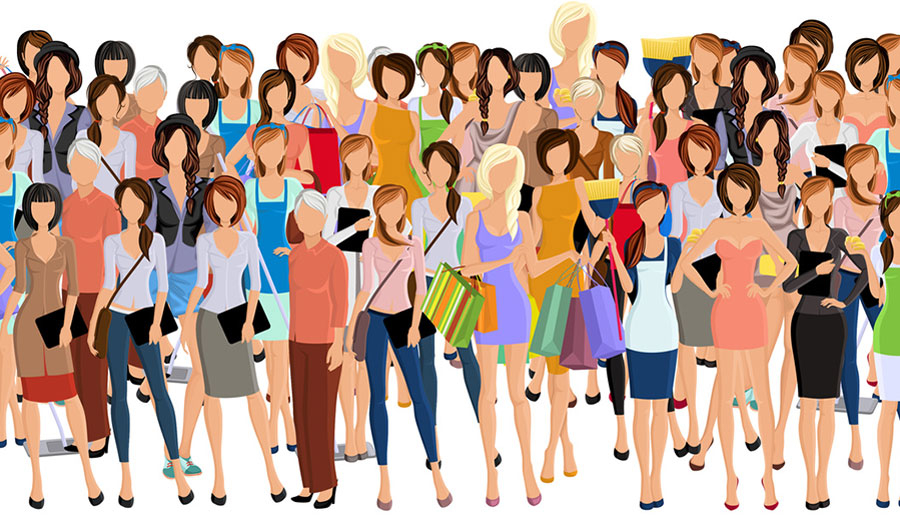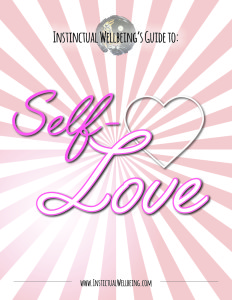It’s a well-recorded fact that autoimmune conditions disproportionately affect women; in fact, 78-80% of those with autoimmune conditions are women. It’s also true though that nobody is 100% sure why this is.
As a man who blogs about autoimmunity, I notice this discrepancy because in some ways, I find the male voice in the autoimmune community lacking (but shoutout to my mate, Rory, from The Paleo PI, for being another positive male voice in the community!). I also run an autoimmune support group of 250+ folks here in Kansas City, and I’d say all but 2 members (myself included) are male. This is a big reason why I like to share my story and perspective, and it’s also why I was determined to learn more about why more than 3/4 of people struggling with autoimmune conditions are women.
To help me figure this out, I split my search into four parts: Physical, Emotional, Social, and Etheric possibilities that may help to explain why more women than men have autoimmune diseases. In all honesty, each one of these possibilities could probably be its own article. But for the sake of this post, I’d like to share with you the most impactful considerations from each group.
One thing before we begin though: If you’re a man reading this, or your husband / brother / cousin / boyfriend has an autoimmune condition, you’ll understand that men struggling with autoimmune conditions is a very real thing. So please don’t think I’m leaving my brothers out — obviously I deal with this day in and day out, so I’m in no way discounting the male autoimmune experience, or trying to say that men who do have AI conditions are any less masculine. I’m simply trying to understand this general trend because I feel that if perhaps we can uncover these differences, we can come one step closer to solving the mystery of autoimmunity.
Also as I like to remind everyone: I am not a doctor, scientist, or fortune-teller. I am simply someone who enjoys doing research, learning new things, and piecing together theories that may help us uncover more about these complex conditions.
So now, let’s dive in.
Physical Possibilities
It’s an obvious fact that biologically, women and men are different. Since autoimmune diseases often present themselves in physical form, I figured this would be the most logical place to begin our investigation. Let’s explore a few different physical factors that may contribute to women having a higher inclination towards these conditions.
Sex hormones
In the next section you’ll read more about how lower levels of testosterone in the female body have been linked to higher immune system responses. Of course we know now that autoimmune conditions result from, in part, an overstimulated immune system that begins to attack healthy tissues and cells in the body, so the role of testosterone in autoimmunity is pretty significant.
The other thing to know about sex hormones and autoimmunity though, is that recent studies have found that female sex hormones like estrogen and prolactin (a protein that allows mammals to produce milk) can stimulate the growth of B cells. The important connection here is how scientists are discovering that B cells play a significant role in the formulation of autoimmune diseases, as they are partially responsible for the production of autoantibodies (which are present in nearly all cases of autoimmune conditions) and inflammatory markers, amongst other things. (If you’re super nerdy like me, check out this journal article about B cell’s role in autoimmunity).
There are also loose correlations between worsening autoimmune symptoms during pregnancy (when female sex hormones are high), and improved symptoms during menopause (when female sex hormones are reduced). While these conclusions aren’t as studied as the other two factors I mentioned, there does seem to be some relationship between pregnancy and menopause and the severity of the autoimmune condition. This may support the importance of considering the link between sex hormones the diseases in women.
Stronger reaction to infections and vaccines, which overproduce antibodies
In my opinion, this is one of the stronger physical explanations to why there’s a higher prevalence of these conditions in women than men.
A study conducted in 2013 analyzed the antibody responses (remember, an overproduction of antibodies is found in nearly every case of AI conditions) in men and women who were given the seasonal flu vaccine. By far, women had higher antibody responses, indicating that women have more powerful immune system responses than men. Researchers linked this response level to the amount of testosterone in one’s body, as study participants with higher testosterone levels had the lowest immune response.
On the bright side, this means that women can kick colds and flus faster than men (see, this is why “Man flu” is a real thing!). On the flip side, it means women’s immune systems are more likely to overreact to stimuli. Again, since we know that autoimmune conditions are, in essence, a result of an overactive immune system, this would help explain why more women have autoimmune conditions than men.
Gene expression (women have two X chromosomes, which may be linked to higher risk of autoimmunity)
According to several journal articles published online through the National Center for Biotechnology Information, “[The] overall female predominance [of autoimmune diseases] suggests possible involvement of the X chromosome.” (source)
This factor deals with epigenetics and can get really complex, really fast, so I’ll keep it as short and sweet as I can. Basically, researchers have found that there are many X-linked genes that are strongly associated with the formation of autoimmune diseases. Since women have two X-chromosomes, there’s a higher chance of one of these X-linked genes expressing itself (i.e. rearing its ugly head and coming to life in the form of an autoimmune condition).
Another finding related to gene expression and autoimmunity involves something researchers are calling the “master regulator of inflammation and autoimmunity,” called VGLL3. This new inflammatory pathway was discovered in a skin study dealing with Psoriasis, where researchers found that the VGLL3 protein was most active in women, leading them to believe that this “promotes autoimmunity in women.” (study source)
The field of epigenetics and gene expression will only continue growing, and I think that it’ll wind up being a big contributor to finding alternative therapeutic options for treating (or maybe even preventing?) autoimmunity. For now though, it seems it’s safe to say that genes do play a role in women’s risk factors for autoimmunity.
Emotional Possibilities
This point is actually a bit tricky, but stay with me for a second while we unravel this together. You see, when I was first planning for this post, I formulated a hypothesis that was something like, “Women have a higher inclination towards autoimmunity because they are more emotional and sensitive than men.” However, as I was doing research for the post, I discovered that despite what conventional wisdom may say, this hypothesis is actually incorrect (or at least, scientifically unsupported).
In fact, most studies show that women and men experience the same level of emotional response to stimuli. What was slightly different, however, was the expression of that emotion. In other words, women aren’t “more emotional” in that they have more emotions; they are just more comfortable with expressing their emotions outwardly.
Similarly, there really aren’t any studies that conclude for certain that women are actually any more sensitive than men, but there are some studies that found a difference between how women and men process emotions and traumatic events.
To support this, I’d like to pull from a recently published study conducted by researchers from China, which explored whether or not differences exist between genders and emotional experience (i.e. are women more emotional than men?). The researchers concluded:
“…the present study does not support the widely accepted notion that women are more emotional than men [13] or that women were more easily affected by emotions [20], but our results support that women often report more intense feelings [31]. We suggest that gender differences in emotional responses should be considered according to different types of emotion, and there should be a distinction between the emotional experience and emotional expressivity.”
Interesting, huh? So then, do emotions and sensitivity not have anything to do with why women have more autoimmune conditions than men? Well, not necessarily.
While some studies do indicate that men and women experience pretty much the same levels of emotional reactivity, and that neither is wired to be innately more sensitive than the other, it seems that the disparity in emotional processing may tell us something.
There’s several ways we could analyze this idea of emotional processing, but for purposes of today’s article, let’s just look at the most compelling. To me, this is the fact that women have what is referred to as a “flashbulb memory.”
This is where memories are recorded and able to be recalled vividly and with extreme detail, as if the event had just occurred. Some studies are showing that this “memory enhancement” may be one of the reasons women are more commonly diagnosed with mood disorders and PTSD. (source)
Why is this? Well, due to this flashbulb memory, women may be more susceptible to re-living stressful events and traumas over and over again, causing their bodies to react strongly and hold onto trapped emotions, even 20 or 30 years later.
As we know, stress is a direct trigger for autoimmune responses, so this presence of a flashbulb memory may be the closest correlation we can draw (at least, in the context of what we’re examining within this article) when it comes to emotions and a higher prevalence of autoimmune disease amongst women.
Social Possibilities
As we begin exploring social factors that may contribute to more women than men having autoimmune conditions, we’ll seek to answer why social factors even matter at all. I’ve broken this section into three main reasons why I think it’s important to look at autoimmunity in women from a social lens, so examine those now.
Trouble Saying No
Many researchers and healers alike believe that when we can’t bring our minds to say “no” to unwanted obligations and events that occur in our lives, that our body will begin to speak up and say “no” for us (a great book about this phenomenon is “When The Body Says No”). Think of this like a protective mechanism, an extra shield that our body is graciously providing us to get away from harmful or stressful situations. Still, when our bodies are forced to speak up for us, the physical symptoms may not feel like something to be thankful for.
Now to be fair, this issue of not being able to say “no” is not exclusive to women. As a species, we humans have a deep-rooted, instinctual desire to fit in and be liked (remember, lack of acceptance in the past meant lack of survival!), so there are plenty of men who are afraid to say no because they are afraid of rocking the boat.
Still, researchers have found that women may have a harder time saying “no” than men.
““More often than not, however, [women] don’t [say “no”]. Or, as gender and evolutionary psychologist Eva Glasrud says, we hedge. Hedging language softens the blow. Women aren’t weak or submissive, she explains; it’s just that when we do say no, everyone — both men and women — responds negatively.”
“It’s yet another example of the ‘double bind,’” Glasrud continues. “If you act in what society deems the ‘feminine’ way, you’ll be punished by not sounding confident, professional and competent. If you act in what society sees as the ‘masculine’ way, you’ll be punished for being overly assertive, bitchy, bossy, overwhelming, rude.”” (source)
If this is true, and society makes women feel as if they can’t stand up or speak up for what they need as much as they should, then it’s possible that the female body may step in (in the form of illness) to say “no” for them — forcing boundaries to be created and leaving the individual with no choice but to turn down yet another social event, or project, obligation, or first date (I actually expand upon this topic of illness playing an important role in our lives in a different blog post). In other words, this point really explores the powerful mind-body connection we all have.
This idea that women may be less willing to create boundaries for themselves is supported by a recent article, which explored the very high rates of burnout amongst Millennial women in the workplace. One woman interviewed in the article reported:
“We are in unprecedented times in terms of the global, always-on organization. It takes a tremendous amount of discipline not to check email at night or first thing in the morning, and not all office cultures (or managers) endorse or demonstrate that restraint themselves. Work comes in at all hours, and it can be hard to create boundaries that keep it contained and allow for proper rest and renewal.
For younger women in particular, it can be hard to say no, especially in competitive jobs or industries where there would be a (perceived) line out the door for their replacement.” (source)
This is corroborated by a study conducted at the University of Kansas (my alma mater!), in which a professor examined attrition rates of professional female journalists. He found that this number has climbed over the years due to more women reporting a high degree of overwhelm and burnout. This leads me to point #2 in the social case for autoimmunity in women.
Burnout + Overwhelm = Stress
Stress is directly linked to the formation and aggravation of autoimmune conditions. So it would be safe to assume that higher stress levels due to feelings of overwhelm and burnout can contribute to a higher risk of autoimmunity.
This is a very hot topic in today’s world, where we are all forced (or at least, strongly encouraged) to stay constantly plugged in, to work harder, to do more, eat clean, and somehow still maintain a family, social lives and a healthy work-life balance.
As I introduced in the above point though, it seems as if women may be more susceptible to the stress and overwhelm that comes from this crazy world because they are constantly having to juggle so many different roles and be “all things to everyone” at all times.
In the New York Times Bestselling Book, Overwhelmed, author Brigid Schulte talks a great deal about this “role overload.”
“Time studies find that a mother, especially one who works outside the home for pay, is among the most time-poor humans on the planet, especially single mothers, weighed down not only by role overload but also what sociologists call “task density”—the intense responsibility she bears and the multitude of jobs she performs in each of those roles.” (pg. 25, Overwhelmed)
She goes on to explain how the time women do have, is often “contaminated” in that it is spent thinking of all the other things she needs to do:
“Time-use researchers call it “contaminated time.” It is a product of both role overload—working and still bearing the primary responsibility for children and home—and task density. It’s mental pollution, one researcher explained. One’s brain is stuffed with all the demands of work along with the kids’ calendars, family logistics, and chores. Sure, mothers can delegate tasks on the to-do list, but even that takes up brain space—not simply the asking but also the checking to make sure the task has been done, and the biting of the tongue when it hasn’t been done as well or as quickly as you’d like. So it is perhaps not surprising that time researchers are finding that, while “free time” may help ease the feeling of time pressure for men, and in the 1970s helped women a little, by 1998 it was providing women no relief at all.” (pgs. 27-28, Overwhelmed)
So overall, it seems as if women are experiencing levels of stress that are unprecedented by any other time period, and dealing with time and role pressures that are not experienced at the same level by their male counterparts. In this way, it would make complete sense as to why the prevalence of stress-driven autoimmune conditions is so high amongst women.
Unreported Autoimmunity in Men?
The final social possibility that may help explain why more women have autoimmunity than men, is a phenomenon that isn’t really new at all, but still important to make note of. That is the simple fact that women tend to go to the doctor and self-report illness more than men.
Why is this significant? Well, it’s significant because we can’t necessarily rule out the possibility that perhaps there actually is a larger percentage of men who have autoimmune conditions, but we simply don’t know about it because men are less likely to utilize medical services than women. (source)
Now, that’s not necessarily to say if all men suddenly started going to the doctor more and reporting their symptoms that the tables would turn and it would be 80% of men and 20% of women who have autoimmunity. Still, I do think that it’s a factor that should be considered from a social standpoint, as the numbers could seem a bit less disproportionate if men were more open about their health conditions and seeking treatment at the same rate women do.
Etheric Possibilities
This last possibility may be a little far-fetched and “wooey” for some, but it’s something that I think about quite often: What if there’s a reason for autoimmunity that exists beyond the 3D world in which we live (physical, emotional, social)? To help explain this idea, I’ll sort of back into this theory and review a couple beliefs I hold:
-
- To me, autoimmunity is an awakening of sorts. A curse and a blessing at the same time, it causes us a lot of pain and frustration but also teaches us a big lesson that ultimately expands our awareness by forcing us to take a much closer look at ourselves and how we’re living our lives.
- I also believe that women are KEY to evolving the consciousness of our planet and creating a better future for generations to come. I mean this as no offense to my male counterparts, but women just have a special level of empathy, openness and understanding that sometimes goes well beyond a man’s desire to go within and tap into his intuition; for women, I think it just comes a bit more naturally. There’s plenty of enlightened men as well, but I do think these qualities make women more likely to reach higher states of consciousness (love, happiness, altruism, etc.), which our world desperately needs right now.
- So, if autoimmunity is here to teach us a lesson and help us awaken ourselves and heal our world, and women are playing a key part in that, wouldn’t it make sense that more women would develop these conditions as a “nudge” to wake up faster? I mean, just look at our thriving community! Thanks to autoimmune conditions, so many people (who happen to be mostly women) are now open to exploring alternative therapies and looking inwardly in their search for answers. We’re also promoting cleaner food, alternative healing practices, a willingness to connect and explore ourselves deeply, a tendency toward yoga practices, a revival of traditional and natural healing modalities, an urgency to identify passions and love what you do — and that’s just the beginning. I think autoimmune conditions will continue to prompt us to explore deeper parts of ourselves and not settle for the status quo.
So, essentially this last point is just me wondering if there’s some sort of master plan to it all — maybe autoimmune conditions are the Universe’s way of pushing us forward as a human race, as a planet, as a world, and as a collective consciousness. And if anyone is up to the mission, it’s women (and, anyone who struggles with autoimmunity just in general). 🙂
Wow — we covered a lot. If you’re still with me to this point, then you are a CHAMP.
Let’s just quickly recap some of the factors we discussed that may help us understand why approximately 70-80% of those with autoimmune conditions are women:
- Female sex hormones
- Higher female immune system reactions to vaccinations
- Gene expression
- A flashbulb memory that may cause traumatic events to be replayed and relived
- Feeling as if it is socially unacceptable to say “no”
- Higher average stress levels due to role overload, task density and “contaminated time” that interferes with an ability to relax and be present
- Lack of illness complaints and general underutilization of medical services by men
- Women are the “chosen ones” being nudged forward to help us further our collective consciousness and get our $hit together as a human race. 🙂
So thank you for reading and for considering these possibilities I’ve put in front of you today.
Before we part ways, there’s one final thing I want to say. If you are a woman reading this and you have an autoimmune condition (or even if you don’t) – please understand that simply being female isn’t the sole reason you have (or may develop) an autoimmune condition. In reality, there are so many contributing factors (including diet and lifestyle) that exist beyond the scope of what we’ve covered here, and some of the best scientists and doctors in the world are still scratching their heads at what causes autoimmune conditions.
So I don’t want anyone to walk away feeling at-fault, hopeless, or like fate is against you and there’s no way you can heal due to your gender. Just the opposite, it’s always my aim to empower you to understand “why,” to take some of the blame off of yourself, and to begin to unravel this mystery as much as possible.
I truly believe the key to healing and to solving problems is to first understand what the underlying causes are, so that’s what I’ve tried to do here — just suggest some possible contributing factors. As I mentioned at the beginning of the article, I hope that discussions like these can bring us one step closer to healing and preventing autoimmune conditions, so that we may all experience our right to total wellness. 🙂
This was a lot to digest, but what thoughts do you have about this topic? I’d love to hear them in the comments section.














What an insightful article. I really appreciate that you, as a man, have come to these realizations, and can relate directly to a lot you have identified. Thank you and I look forward to reading more on your research.
Thanks for taking the time to read the article, Louise. I’m always pushing myself to think a bit differently and learn more about autoimmunity, so I appreciate the acknowledgement.
Soo completely accurate..
Particularly..the “no” and the “collective consciousness “.. I’ve found that to be my truth…
Briiliant..thank you..
Glad it resonated with you, Sandy! Thanks for reading.
Amazingly insightful article. I’ve been wondering about this myself for a long time. You touched on vaccinations and explained how they may play a part. I was wondering if epidurals would fall under this category.
Thanks for reading, Marianna! That’s a great question about epidurals – I haven’t seen any research on that, but maybe something to keep in mind!
A complex coverage of the subject from many viewpoints. Good read. Thanks.
Glad you enjoyed, Roxy!
I like your article. Thanks. Just the menopause bit though – a lot of women seem to get AI issues during perimenopause or menopause. That’s when I got mine. Also there is a link to pathogens – e.g. I got glandular fever in my 50s, which led to chronic fatigue, then I developed an AI disease. I still get GF flares. I know my story is pretty typical. Just some more to think about.
Yes, absolutely. I read a lot about menopause in my research, and there’s a lot of info/consideration there. I appreciate you sharing your experience!
I really think you are onto something here…i als think a similar relationship can be made between each of these areas and various cancers.
Yes, I would agree with that, Tanya. Thanks for reading!
Wow! I love this article. A lot of truth and insight. Thank you so much!!
You’re welcome, Karen! Thanks for reading. 🙂
Another possibile reason for the imbalance may have to do with cosmetics and personal care products. Women bear a much much higher toxic load than men due to these products being absorbed directly into the skin.
That’s a very interesting consideration, as well!
I feel so related to this article! Amazing ! Thank you. God bless you ????
Glad you could relate, Susmita!
Interesting article which resonated with me…especially the stuff about being a single mother…having had a complete lifestyle change with massive stress reduction many of my subtle allergy symptoms have disappeared. Major issue now is how to best help son with Crohn’s 🙁